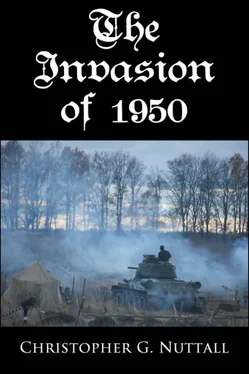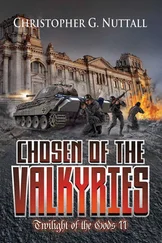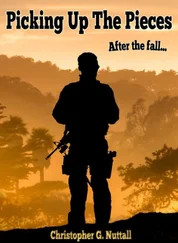He rubbed the bruises on his arm. No one had expected Kim Philby, of all people, to be a German spy. If his experience had been like the other spies who had been rounded up and interrogated, Philby had believed he was spying for the Russians, something that bothered Churchill greatly. The Communists had a wide appeal that the Nazis lacked, and they might well have subverted others… and, if the Germans had understood that, they might have subverted hundreds who didn’t really know who they served.
MI5 had put together an entire series of teams working on the question of just how much Philby had told the Germans, but a person in his position could have told them almost anything from the files. Hollis, at least, had had the dignity to commit suicide once he’d figured out the truth. The others, most of whom had come from Cambridge, didn’t wanted to believe the truth. Churchill had cracked a joke about how Oxford boys were more loyal to the country, but the truth was that they no longer knew who to trust. The only advantage they had was that the Germans might not know that the remainder of the spy ring had been broken.
DeRiemer had urged Churchill, as strongly as he dared, to leave Skorzeny’s death a mystery. Churchill had turned it down; the chance to gloat on the BBC about how Skorzeny had been killed by an old man was too good to pass up, particularly with the reputation the Germans had created for their champion. He had done most of the things they said he had, but in the end, he’d taken it a step too far. Even DeRiemer hadn’t known that Churchill was armed. The Government of Britain would survive.
Monty strode over and clapped a hand on DeRiemer’s back. “Welcome back, hero. How’s the Prime Minister?”, needling DeRiemer just a little. Churchill’s praise of DeRiemer’s actions under fire had spread far and wide. DeRiemer didn’t want to admit that he barely remembered what had happened. As far as he was concerned, he had flunked his first trial under fire.
Churchill hadn’t accepted more than a quick check-up by the doctor. The Prime Minister had shrugged off Skorzeny’s death before returning to his office and cheerfully informing the nation — and the Germans — that the rumours of his death were gravely exaggerated.
“The Prime Minister is fine,” DeRiemer answered Monty, keeping a web of complex emotions off his face. “He wants a final progress report before the attack is launched. Do the Germans know that you’re coming?”
“I’d be surprised if they didn’t know,” Monty said grimly. “I’d like to hope that we obtained perfect surprise, but under the circumstances, I would be astonished if they didn’t have any idea that we were coming. We’ve been probing the German lines with infantry and commando forces of our own for the past week, but the Germans haven’t been probing us with anything like as much vigour, something that worried us and actually had us standing to attention in the face of a possible attack.”
DeRiemer lifted an eyebrow. “You expected an attack?”
“Any attacker needs to know the positions of the enemy and the lay of the land,” Monty said. “The German probing attacks before their massive assault against the Colchester Line were intended to scout out our locations and identify formations in their positions, but they reduced their operations for a few days before the operation began, in hopes of catching us off guard. If they were doing the same here…”
He shrugged and continued, “Be that as it may, we have all four forces in position and prepared for the offensive. Once I blow the whistle, everything we have will advance against the enemy, under cover of thousands of guns and as many aircraft as we can scrape together. One of the stay-behind units managed to put a German airfield out of action, hampering their attempts to resupply themselves from the air, so the Germans will have to send aircraft in from the continent. That gives us an advantage.
“At the same time, commando teams we have inserted behind enemy lines and the forces trapped in Colchester and the smaller towns will make their own attacks,” he concluded. “The Germans will have to respond to multiple threats at once, each one potentially lethal on its own, not unlike they did to us the night they landed. We’ll break their force, break them, and then race to Felixstowe.”
“I hope you’re right,” DeRiemer said slowly. “How long until the offensive?”
Monty checked his watch. “Two hours. Do you want to join me in the command vehicle?”
DeRiemer considered it. Truthfully, he would have preferred to return to London, but Churchill had wanted a personal report — had even seriously considered coming north himself to join Monty. It had taken the combined efforts of several people to talk him out of that, but DeRiemer still worried about it; Churchill, he was starting to suspect, didn’t want to live on past the end of the war. He’d been removed from office once, only to have to watch as the next government betrayed the country he had fought so hard to protect; he didn’t want to do that again. The world was changing and Churchill, the bulldog Prime Minister, was slowly growing out of place.
“I’ll remain with you for the moment,” DeRiemer said. He owed Churchill that much. “What happens if the assault fails?”
Monty looked disgustingly confident and said dryly, “It will be back to the drawing board. Don’t worry about it too much, Alex. This assault has everything going for it. If it fails, it will be through lack of determination on our part, and the men have all the determination that they could need. The German atrocities have ensured that for us.”
* * *
All along the line, British, American and Commonwealth soldiers waited impatiently. Huddled in bunkers, they nervously checked their weapons and wrote letters to loved ones. As they prepared for the big push, thousands of the men prayed that their faith in Monty was justified.
Some were filled with foreboding as they worried over their first combat action. Others relished the thought of finally going into battle and taking the offensive. These eager beavers had never experienced battle either. The combat vets took care of the details and didn’t think about the big picture or the future. It would come when it came, and not a moment before.
For the survivors of the Home Guard units, this was their chance for revenge. They had been born and bred in the occupied areas of the country, and the news about the German atrocities had shocked them deeply. Some of them were the only survivors of their towns and villages, others knew that their relatives and friends were in the hands of the Germans, and felt a cold determination to return and free their loved ones. After weeks of combat, the Home Guard was impossible to distinguish from a regular army unit, and their preparations mirrored the rest of the line as they readied themselves to face the heartbreaking scenes they were sure to face in the very near future. One way or another, they were going home.
Monty sat alone in his command vehicle. He had no one to turn to for reassurance. The loneliness of command gripped him firmly and refused to let go. He’d maintained a brave face in front of DeRiemer, but it hit him now that if he failed, the Germans might just have a chance to strike back and still win the Battle of Britain. He maintained a confident appearance… and he knew, now, that he wasn’t confident at all. He had issued all of the orders, made his plans and trusted in his subordinates to carry them out, but what if they failed?
Ten miles to the north, the German soldiers checked their own weapons and supplies, knowing that they were desperately short of both. They trusted Rommel, had more faith in him than they had in the Fuhrer , but they knew just how short the supplies actually were. They weren’t beaten, not yet, but the exhortations from Radio Berlin to stand and fight were more demoralising than looking up and seeing a wave of British tanks advancing towards their position.
Читать дальше












